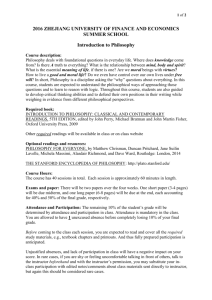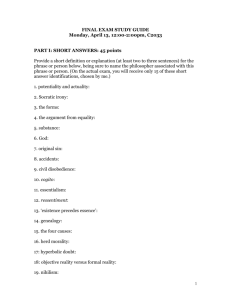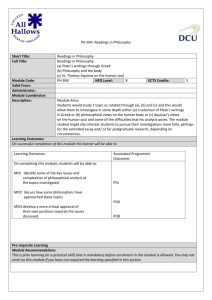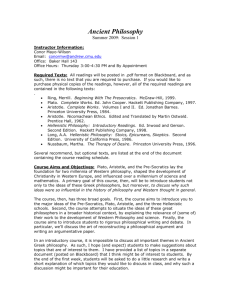HU_2700
advertisement
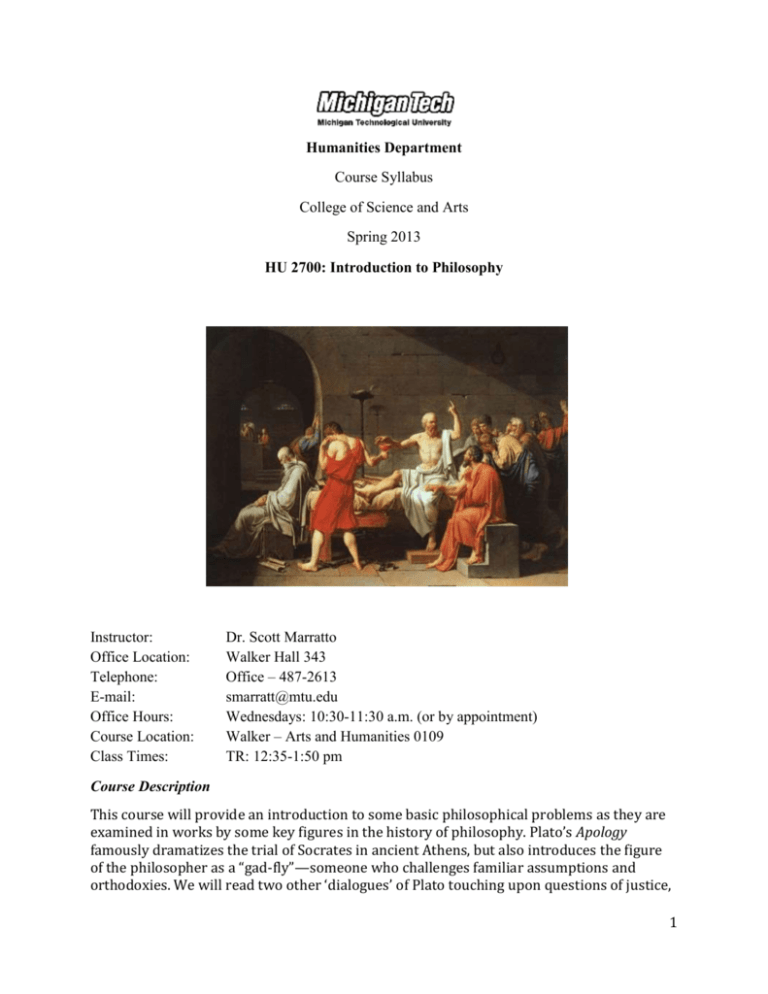
Humanities Department Course Syllabus College of Science and Arts Spring 2013 HU 2700: Introduction to Philosophy Instructor: Office Location: Telephone: E-mail: Office Hours: Course Location: Class Times: Dr. Scott Marratto Walker Hall 343 Office – 487-2613 smarratt@mtu.edu Wednesdays: 10:30-11:30 a.m. (or by appointment) Walker – Arts and Humanities 0109 TR: 12:35-1:50 pm Course Description This course will provide an introduction to some basic philosophical problems as they are examined in works by some key figures in the history of philosophy. Plato’s Apology famously dramatizes the trial of Socrates in ancient Athens, but also introduces the figure of the philosopher as a “gad-fly”—someone who challenges familiar assumptions and orthodoxies. We will read two other ‘dialogues’ of Plato touching upon questions of justice, 1 law, knowledge and the role of philosophy in relation to the political sphere. Thomas Hobbes Leviathan is one of the fundamental texts in modern philosophy and political thought. Hobbes offers accounts of human nature, the grounds of knowledge and morality, and the character of politics that challenged many familiar assumptions and that tried to lend support for a more naturalistic account of the self and of politics. Descartes’ Meditations is another foundational text in modern philosophy dealing with problems concerning the relation between understanding and sensation, the self, God, skepticism, error, and the modern conceptions of science and nature. We will examine these texts to see how they have contributed to the shaping of many of our own assumptions but also to see how they can continue to challenge our familiar ideas about of ourselves and our world. Finally we will read a very contemporary text that explores many of the key concepts and ideas in 20th century philosophy—the problems of meaning, embodiment, freedom and responsibility, the character of our relations with others—and that also aims to show how philosophy can be understood as a kind of therapeutic practice leading to new possibilities for understanding ourselves and our relation to the world. In exploring these texts we will ask in particular about the way in which philosophy has, perhaps from its very beginnings, occupied a crucial place in the development of political life and its institutions. Philosophy has taken up the challenge of criticizing familiar ideas and prejudices (including the hold of family and tradition over individuals) in order to make possible a form of intellectual life appropriate to the idea of responsible citizenship. Course Resources Course Website: Blackboard: http://www.courses.mtu.edu Required Course Texts (available at the bookstore): Sophocles, Antigone (a new translation). Diane J. Rayor (trans.). Cambridge University Press, 2011. Plato, Five Dialogues: Euthryphro, Apology, Crito, Meno, Phaedo (2nd edition). G.M.A Gruber (trans.). Hackett, 2002. Thomas Hobbes, Leviathan (Oxford World's Classics). J.C.A Gaskin (ed.). Oxford University Press, USA; Reissue edition (February 15, 2009) René Descartes, Meditations on First Philosophy (3rd edition). Donald A. Cress (trans.). Hackett, 1993. John Russon, Human Experience: Philosophy, Neurosis, and the Elements of Everyday Life. State University of New York Press, 2003. 2 Grading Scheme 3 short papers (on assigned questions) 5 (out of 8) in-class (surprise!) quizzes Class participation/tutorial discussion Midterm exam Final exam Total 30% 20% 5% 20% 25% 100 Assignments: Short papers: For each paper, I will assign a question about one of the texts and you will provide an answer in 3-4 double-spaced pages. To answer this question effectively you will need to be engaging with and reflecting upon the central themes of the texts. You will not need to consult secondary sources. Each of your short papers must include a “works cited” page in which you provide a proper bibliographic reference (using MLA style) for the text that you are asked to discuss. Remember to include your name, the course number, and the assignment due date on the first page (or title page). Pages must be numbered and stapled prior to submission. In-class quizzes: In a philosophy class it is of the utmost importance that you keep up with the readings (and that you read with care and attention). In fact, it will be difficult to do well in the course if you have not kept up with the reading. In order to ensure that you have no trouble with this, the readings in this course have been limited to an average of about 30 pages/week. However, as an extra incentive to stay on top of the readings there will be EIGHT very short surprise quizzes (lasting roughly 5-10 minutes) designed simply to evaluate your familiarity with the content of the readings. Only the best FIVE of these test results will be counted toward your final grade. You should come to each class prepared to answer a few simple questions about the day’s readings. Note that these quizzes will be given at the beginning of class, so, if you are absent or late for class you will miss it. Class participation/tutorial discussion: Students in this course are strongly encouraged to come to each class prepared to ask questions about the readings. From time to time, all or a portion of a Friday class will be dedicated to tutorial discussion and questions. Your active participation in these discussions will count toward your final grade in the course. Final Exam: There will be a one-hour, in-class, midterm, and one-hour final exam during the exam period. Course Policies Academic integrity is essential to a student’s education. Plagiarism, Cheating, Fabrication and Facilitating Academic Dishonesty are offences that will not be tolerated. Plagiarism—loosely defined as the presentation of the work of another author as if it were your own—will not be tolerated. If you are unclear about how to cite your sources properly, you are urged to discuss the matter with the instructor before submitting an assignment. Academic regulations and procedures are governed by University policy. Academic dishonesty cases will be handled in accordance with the University policy. SEE http://www.mtu.edu/dean/conduct/policy/academic-integrity/. If you have questions about plagiarism that are not resolved after reading the policy, ask me for help. 3 Class Attendance is very important. Three excused or unexcused absences are permitted; it is your responsibility to notify the instructor if you cannot be in class. More than three unexcused absences can result in a lowering of the final course grade, and additional unexcused absences may result in a grade of F being recorded for the entire course. See http://www.mtu.edu/dean/conduct/policy/attendance/ for more information. Late Policy: Unless otherwise specified on the assignment, all papers and assignments must be submitted via Canvas (as Word or PDF documents) by 9 am on the day that they are due. Late papers will be subject to a 10% reduction in grade for each week, or part thereof, of lateness, up to 30%. Communication: Please direct all electronic communication (other than paper submissions) to me via email (smarratt@mtu.edu) rather than through Canvas. Please indicate the course number (HU 2700) in the subject line for all emails. Cell Phones, Laptops and other electronic devices: Cell phones, Blackberries, iPods, PDAs, or any other electronic devices are not to be used in the classroom. Such devices must be turned off and stowed away during. In general, laptops are also not permitted except by prior arrangement with me. University Policy: Student work products (exams, essays, projects, etc.) may be used for purposes of university, program, or course assessment. All work used for assessment purposes will not include any individual student identification. Disabilities If you have a disability that could affect your performance in this class or that requires an accommodation under the Americans with Disabilities Act, please see me as soon as possible so that we can make appropriate arrangements. The Affirmative Action Office has asked that you be made aware of the following: Michigan Tech complies with all federal and state laws and regulations regarding discrimination, including the Americans with Disabilities Act of 1990. If you have a disability and need a reasonable accommodation for equal access to education or services at Michigan Tech, please call the Dean of Students Office, at 487-2212. For other concerns about discrimination, you may contact your advisor, department head or the Affirmative Action Office, at 487-3310. Affirmative Action: http://www.admin.mtu.edu/aao/ Disability Services: http://www.admin.mtu.edu/urel/studenthandbook/student_services.html#disability Equal Opportunity Statement: http://www.admin.mtu.edu/admin/boc/policy/ch3/ch3p7.htm 4 Tentative Schedule of Readings and Assignments Week 1: T: Jan 15: Introduction R: Jan 17: Antigone Week 2: T: Jan 22: Antigone (con’d) R: Jan 24: Plato’s “Apology” Week 3: T: Jan 29: Plato’s “Apology” (cont’d) R: Jan 31: Plato’s “Crito” Week 4: T: Feb 5: Plato’s “Crito” [first paper assigned] Week 5: T: Feb 12: Plato’s “Meno” R: Feb 14: Plato’s “Meno” (cont’d) Week 6: T: Feb 19: Hobbes’s Leviathan (Introduction and pp. 7-45) [first paper due] R: Feb 21: (cont’d) Week 7: T: Feb 26: Hobbes’s Leviathan (pp. 82-96; 111-122; 132-144) R: Feb 28: MIDTERM EXAM Week 8: T: March 5 : Descartes’ Meditations “Letter of Dedication” and “Preface to the Reader” R: March 7: Descartes’ Meditations 1&2 [second paper assigned] 5 SPRING BREAK Week 9: T: March 19: Descartes’ Meditations 3-6 [second paper due] R: March 21: (cont’d) Week 10: T: March 26: Russon, Human Experience, Inroduction and Ch. 1 R: March 28: (cont’d) Week 11: T: April 2: Russon, Human Experience, Ch. 2-3 [third paper assigned] R: April 4: (cont’d) Week 12: T: April 9: Russon, Human Experience, Ch. 4-5 R: April 11: (cont’d) Week 13: T: April 16: “The examined Life” (film) [third paper due] R: April 18: (cont’d) Week 14: T: April 23: Russon, Ch. 6 R: April 25: Conclusion FINAL EXAM during exam week. 6

